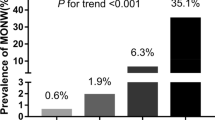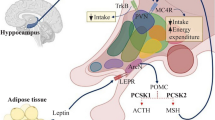Abstract
Purpose
The relationship between the rs9939609 allele of fat mass and obesity-associated (FTO) gene and metabolic syndrome (MS) susceptibility has been evaluated by many studies, however, the results still remained controversial in the Chinese population. In order to provide more accurate results, we performed this meta-analysis.
Methods
We searched PubMed, and Wanfang Med Online in both English and Chinese, and eight eligible studies comprising of 5345 cases and 9523 controls were eventually selected into our meta-analysis. The meta-analysis was performed using the STATA 12.0 software.
Results
In pooled analysis, the FTO gene rs9939609 polymorphism significantly increased MS susceptibility under per-allele comparisons (A vs. T) (OR 1.21, 95% CI 1.10–1.35, P < 0.001) and in dominant model (OR 1.35, 95% CI 1.13–1.62, P < 0.001). Subgroup analyses under per-allele comparisons (A vs. T) indicated that the elevated risk was observed in adults (OR 1.26, 95% CI 1.08–1.47, P = 0.003) but not in children and adolescents (OR 1.14, 95% CI 0.95–1.36, P = 0.17), and that the risk for increasing MS was only identified in IDF groups (OR 1.22, 95% CI 1.03–1.43, P = 0.018) but not in NCEP ATP III groups (OR 1.14, 95% CI 0.95–1.36, P = 0.17); in both population-based (PB) and hospital-based (HB) groups, A alleles of rs9939609 appeared to be linked to increased MS susceptibilities (HB group: OR 1.51, 95% CI 1.10–2.08, P = 0.01; PB group: OR 1.19, 95% CI 1.09–1.30, P < 0.001). No significant association was established in dominant model subgroup analyses except PB group (OR 1.29, 95% CI 1.05–1.53, P < 0.001).
Conclusion
Our results suggested that the FTO gene rs9939609 polymorphism significantly increased MS susceptibility in Chinese. Our results should be verified by well-designed studies with larger sample size.



Similar content being viewed by others
References
K.G. Alberti, P. Zimmet, J. Shaw; Group, I.D.F.E.T.F.C., The metabolic syndrome—a new worldwide definition. Lancet 366(9491), 1059–1062 (2005). https://doi.org/10.1016/S0140-6736(05)67402-8
U. Ekelund, S. Anderssen, L.B. Andersen, C.J. Riddoch, L.B. Sardinha, J. Luan, K. Froberg, S. Brage, Prevalence and correlates of the metabolic syndrome in a population-based sample of European youth. Am. J. Clin. Nutr. 89(1), 90–96 (2009). https://doi.org/10.3945/ajcn.2008.26649
J. Steinberger, S.R. Daniels, R.H. Eckel, L. Hayman, R.H. Lustig, B. McCrindle, M.L. Mietus-Snyder, American Heart Association Atherosclerosis, Hypertension, and Obesity in the Young Committee of the Council on Cardiovascular Disease in the Young; Council on Cardiovascular Nursing; and Council on Nutrition, Physical Activity, and Metabolism., Progress and challenges in metabolic syndrome in children and adolescents: a scientific statement from the American Heart Association Atherosclerosis, Hypertension, and Obesity in the Young Committee of the Council on Cardiovascular Disease in the Young; Council on Cardiovascular Nursing; and Council on Nutrition, Physical Activity, and Metabolism. Circulation 119(4), 628–647 (2009). https://doi.org/10.1161/CIRCULATIONAHA.108.191394
C.P. Cannon, Mixed dyslipidemia, metabolic syndrome, diabetes mellitus, and cardiovascular disease: clinical implications. Am. J. Cardiol. 102(12A), 5L–9L (2008). https://doi.org/10.1016/j.amjcard.2008.09.067
H. Belfki, S. Ben Ali, H. Aounallah-Skhiri, P. Traissac, S. Bougatef, B. Maire, F. Delpeuch, N. Achour, H. Ben Romdhane, Prevalence and determinants of the metabolic syndrome among Tunisian adults: results of the Transition and Health Impact in North Africa (TAHINA) project. Public Health Nutr. 16(4), 582–590 (2013). https://doi.org/10.1017/S1368980012003291
Y. Wu, Y. Yu, T. Zhao, S. Wang, Y. Fu, Y. Qi, G. Yang, W. Yao, Y. Su, Y. Ma, J. Shi, J. Jiang, C. Kou, Interactions of environmental factors and APOA1-APOC3-APOA4-APOA5 gene cluster gene polymorphisms with metabolic syndrome. PloS One 11(1), e0147946 (2016). https://doi.org/10.1371/journal.pone.0147946
J.H. Yin, Z.Y. Song, P.F. Shan, J. Xu, Z.M. Ye, X.H. Xu, S.Z. Zhang, Q. Liang, Y. Zhao, Z. Ren, Y.P. Yu, Age- and gender-specific prevalence of carotid atherosclerosis and its association with metabolic syndrome in Hangzhou, China. Clin. Endocrinol. 76(6), 802–809 (2012). https://doi.org/10.1111/j.1365-2265.2011.04198.x
B. Chen, D. Yang, Y. Chen, W. Xu, B. Ye, Z. Ni, The prevalence of microalbuminuria and its relationships with the components of metabolic syndrome in the general population of China. Clin. Chim. Acta 411(9-10), 705–709 (2010). https://doi.org/10.1016/j.cca.2010.01.038
H. Zuo, Z. Shi, X. Hu, M. Wu, Z. Guo, A. Hussain, Prevalence of metabolic syndrome and factors associated with its components in Chinese adults. Metabolism 58(8), 1102–1108 (2009). https://doi.org/10.1016/j.metabol.2009.04.008
T.O. Cheng, Prevalence of metabolic syndrome is still underestimated in the Chinese population. Int. J. Cardiol. 116(2), 257–258 (2007). https://doi.org/10.1016/j.ijcard.2006.04.050
B. Fathi Dizaji, The investigations of genetic determinants of the metabolic syndrome. Diabetes Metab. Syndr. 12(5), 783–789 (2018). https://doi.org/10.1016/j.dsx.2018.04.009
E. Fanning, D. O’Shea, Genetics and the metabolic syndrome. Clin. Dermatol. 36(1), 9–13 (2018). https://doi.org/10.1016/j.clindermatol.2017.09.003
E. Zeggini, M.N. Weedon, C.M. Lindgren, T.M. Frayling, K.S. Elliott, H. Lango, N.J. Timpson, J.R. Perry, N.W. Rayner, R.M. Freathy, J.C. Barrett, B. Shields, A.P. Morris, S. Ellard, C.J. Groves, L.W. Harries, J.L. Marchini, K.R. Owen, B. Knight, L.R. Cardon, M. Walker, G.A. Hitman, A.D. Morris, A.S. Doney, M.I. McCarthy, A.T. Hattersley, Wellcome Trust Case Control Consortium, Replication of genome-wide association signals in UK samples reveals risk loci for type 2 diabetes. Science 316(5829), 1336–1341 (2007). https://doi.org/10.1126/science.1142364
C. Dina, D. Meyre, S. Gallina, E. Durand, A. Korner, P. Jacobson, L.M. Carlsson, W. Kiess, V. Vatin, C. Lecoeur, J. Delplanque, E. Vaillant, F. Pattou, J. Ruiz, J. Weill, C. Levy-Marchal, F. Horber, N. Potoczna, S. Hercberg, C. Le Stunff, P. Bougneres, P. Kovacs, M. Marre, B. Balkau, S. Cauchi, J.C. Chevre, P. Froguel, Variation in FTO contributes to childhood obesity and severe adult obesity. Nat. Genet. 39(6), 724–726 (2007). https://doi.org/10.1038/ng2048
A. Hinney, T.T. Nguyen, A. Scherag, S. Friedel, G. Bronner, T.D. Muller, H. Grallert, T. Illig, H.E. Wichmann, W. Rief, H. Schafer, J. Hebebrand, Genome wide association (GWA) study for early onset extreme obesity supports the role of fat mass and obesity associated gene (FTO) variants. PloS One 2(12), e1361 (2007). https://doi.org/10.1371/journal.pone.0001361
T.M. Frayling, N.J. Timpson, M.N. Weedon, E. Zeggini, R.M. Freathy, C.M. Lindgren, J.R. Perry, K.S. Elliott, H. Lango, N.W. Rayner, B. Shields, L.W. Harries, J.C. Barrett, S. Ellard, C.J. Groves, B. Knight, A.M. Patch, A.R. Ness, S. Ebrahim, D.A. Lawlor, S.M. Ring, Y. Ben-Shlomo, M.R. Jarvelin, U. Sovio, A.J. Bennett, D. Melzer, L. Ferrucci, R.J. Loos, I. Barroso, N.J. Wareham, F. Karpe, K.R. Owen, L.R. Cardon, M. Walker, G.A. Hitman, C.N. Palmer, A.S. Doney, A.D. Morris, G.D. Smith, A.T. Hattersley, M.I. McCarthy, A common variant in the FTO gene is associated with body mass index and predisposes to childhood and adult obesity. Science 316(5826), 889–894 (2007). https://doi.org/10.1126/science.1141634
D. Zhou, H. Liu, M. Zhou, S. Wang, J. Zhang, L. Liao, F. He, Common variant (rs9939609) in the FTO gene is associated with metabolic syndrome. Mol. Biol. Rep. 39(6), 6555–6561 (2012). https://doi.org/10.1007/s11033-012-1484-4
C.M. Povel, J.M. Boer, E. Reiling, E.J. Feskens, Genetic variants and the metabolic syndrome: a systematic review. Obes. Rev. 12(11), 952–967 (2011). https://doi.org/10.1111/j.1467-789X.2011.00907.x
H. Wang, S. Dong, H. Xu, J. Qian, J. Yang, Genetic variants in FTO associated with metabolic syndrome: a meta- and gene-based analysis. Mol. Biol. Rep. 39(5), 5691–5698 (2012). https://doi.org/10.1007/s11033-011-1377-y
Y.H. Hu, J.M. Liu, M. Zhang, R.L. Ma, H. Guo, K. Wang, J. He, Y.Z. Yan, D.S. Rui, F. Sun, L.T. Mu, Q. Niu, Y.S. Ding, J.Y. Zhang, S.G. Li, S.X. Guo, Association between polymorphisms of fat mass and obesity-associated gene and metabolic syndrome in Kazakh adults of Xinjiang, China. Genet. Mol. Res. 14(4), 14597–14606 (2015). https://doi.org/10.4238/2015.November.18.23
X. Kong, X. Zhang, X. Xing, B. Zhang, J. Hong, W. Yang, The association of type 2 diabetes loci identified in genome-wide association studies with metabolic syndrome and its components in a Chinese population with type 2 diabetes. PloS One 10(11), e0143607 (2015). https://doi.org/10.1371/journal.pone.0143607
X. Zhao, B. Xi, Y. Shen, L. Wu, D. Hou, H. Cheng, J. Mi, An obesity genetic risk score is associated with metabolic syndrome in Chinese children. Gene 535(2), 299–302 (2014). https://doi.org/10.1016/j.gene.2013.11.006
W. Wu, Study on the Hui and Han children and adolescent with metabolic syndrome and MS with the gene FTO rs9939609 polymorphism. Master’s Thesis of Ningxia Medical University. Yinchuan, China (2016) (Publication in Chinese)
A. Stang, Critical evaluation of the Newcastle-Ottawa scale for the assessment of the quality of nonrandomized studies in meta-analyses. Eur. J. Epidemiol. 25(9), 603–605 (2010). https://doi.org/10.1007/s10654-010-9491-z
S.A. Al-Attar, R.L. Pollex, M.R. Ban, T.K. Young, P. Bjerregaard, S.S. Anand, S. Yusuf, B. Zinman, S.B. Harris, A.J. Hanley, P.W. Connelly, M.W. Huff, R.A. Hegele, Association between the FTO rs9939609 polymorphism and the metabolic syndrome in a non-Caucasian multi-ethnic sample. Cardiovasc. Diabetol. 7, 5 (2008). https://doi.org/10.1186/1475-2840-7-5
T. Wang, Y. Huang, X.H. Xiao, D.M. Wang, C.M. Diao, F. Zhang, L.L. Xu, Y.B. Zhang, W.H. Li, L.L. Zhang, Y. Zhang, X.F. Sun, Q. Zhang, The association between common genetic variation in the FTO gene and metabolic syndrome in Han Chinese. Chin. Med. J. 123(14), 1852–1858 (2010)
Q. Wan, B. Zhou, J. Fan, Q. Li, H. Wang, Effect of interactions between FTO gene variation and lifestyle on metabolic syndrome. Med. J. Chin. People’s Liberation Army 35(5), 513–516 (2010) (Publication in Chinese)
Z. Xu, J. Song, H. Wang, G. Li, Study on the relationship between MC4R, FTO gene polymorphisms and metabolic syndrome-related phenotypes. Mod. Prev. Med. 39(8), 1866–1870 (2012) (Publication in Chinese)
T. Gerken, C.A. Girard, Y.C. Tung, C.J. Webby, V. Saudek, K.S. Hewitson, G.S. Yeo, M.A. McDonough, S. Cunliffe, L.A. McNeill, J. Galvanovskis, P. Rorsman, P. Robins, X. Prieur, A.P. Coll, M. Ma, Z. Jovanovic, I.S. Farooqi, B. Sedgwick, I. Barroso, T. Lindahl, C.P. Ponting, F.M. Ashcroft, S. O’Rahilly, C.J. Schofield, The obesity-associated FTO gene encodes a 2-oxoglutarate-dependent nucleic acid demethylase. Science 318(5855), 1469–1472 (2007). https://doi.org/10.1126/science.1151710
Z. Han, T. Niu, J. Chang, X. Lei, M. Zhao, Q. Wang, W. Cheng, J. Wang, Y. Feng, J. Chai, Crystal structure of the FTO protein reveals basis for its substrate specificity. Nature 464(7292), 1205–1209 (2010). https://doi.org/10.1038/nature08921
M. Rask-Andersen, M.S. Almen, H.R. Olausen, P.K. Olszewski, J. Eriksson, R.A. Chavan, A.S. Levine, R. Fredriksson, H.B. Schioth, Functional coupling analysis suggests link between the obesity gene FTO and the BDNF-NTRK2 signaling pathway. BMC Neurosci. 12, 117 (2011). https://doi.org/10.1186/1471-2202-12-117
P.K. Olszewski, R. Fredriksson, J.D. Eriksson, A. Mitra, K.J. Radomska, B.A. Gosnell, M.N. Solvang, A.S. Levine, H.B. Schioth, Fto colocalizes with a satiety mediator oxytocin in the brain and upregulates oxytocin gene expression. Biochem. Biophys. Res. Commun. 408(3), 422–426 (2011). https://doi.org/10.1016/j.bbrc.2011.04.037
P.K. Olszewski, R. Fredriksson, A.M. Olszewska, O. Stephansson, J. Alsio, K.J. Radomska, A.S. Levine, H.B. Schioth, Hypothalamic FTO is associated with the regulation of energy intake not feeding reward. BMC Neurosci. 10, 129 (2009). https://doi.org/10.1186/1471-2202-10-129
A. Auton, L.D. Brooks, R.M. Durbin, E.P. Garrison, H.M. Kang, J.O. Korbel, J.L. Marchini, S. McCarthy, G.A. McVean, G.R:. Abecasis,1000 Genomes Project Consortium, A global reference for human genetic variation. Nature 526(7571), 68–74 (2015). https://doi.org/10.1038/nature15393
L. Brunkwall, U. Ericson, S. Hellstrand, B. Gullberg, M. Orho-Melander, E. Sonestedt, Genetic variation in the fat mass and obesity-associated gene (FTO) in association with food preferences in healthy adults. Food Nutr. Res. 57 (2013). https://doi.org/10.3402/fnr.v57i0.20028
J.E. Cecil, R. Tavendale, P. Watt, M.M. Hetherington, C.N. Palmer, An obesity-associated FTO gene variant and increased energy intake in children. N. Engl. J. Med. 359(24), 2558–2566 (2008). https://doi.org/10.1056/NEJMoa0803839
M. Tanofsky-Kraff, J.C. Han, K. Anandalingam, L.B. Shomaker, K.M. Columbo, L.E. Wolkoff, M. Kozlosky, C. Elliott, L.M. Ranzenhofer, C.A. Roza, S.Z. Yanovski, J.A. Yanovski, The FTO gene rs9939609 obesity-risk allele and loss of control over eating. Am. J. Clin. Nutr. 90(6), 1483–1488 (2009). https://doi.org/10.3945/ajcn.2009.28439
Funding
This work was supported by grants from the Natural Science Foundation of Hubei Province (Nos. 2019CFB405 and 2016CFB212), Hubei Provincial Health and Family Planning Commission (No. WJ2019Q054).
Author information
Authors and Affiliations
Corresponding authors
Ethics declarations
Conflict of interest
The authors declare that they have no conflict of interest.
Additional information
Publisher’s note Springer Nature remains neutral with regard to jurisdictional claims in published maps and institutional affiliations.
Rights and permissions
About this article
Cite this article
Wang, D., Wu, Z., Zhou, J. et al. Rs9939609 polymorphism of the fat mass and obesity-associated (FTO) gene and metabolic syndrome susceptibility in the Chinese population: a meta-analysis. Endocrine 69, 278–285 (2020). https://doi.org/10.1007/s12020-020-02280-x
Received:
Accepted:
Published:
Issue Date:
DOI: https://doi.org/10.1007/s12020-020-02280-x




